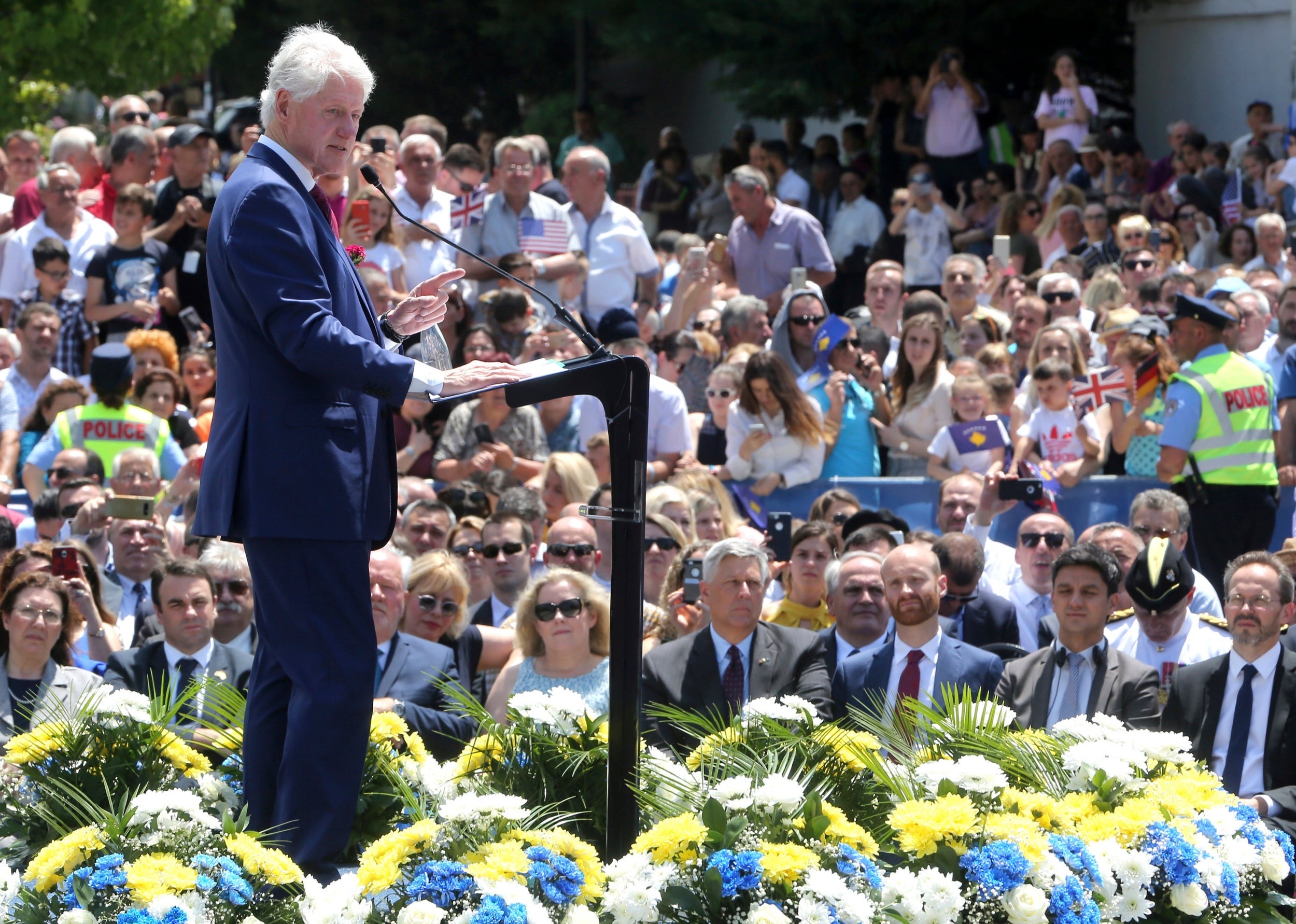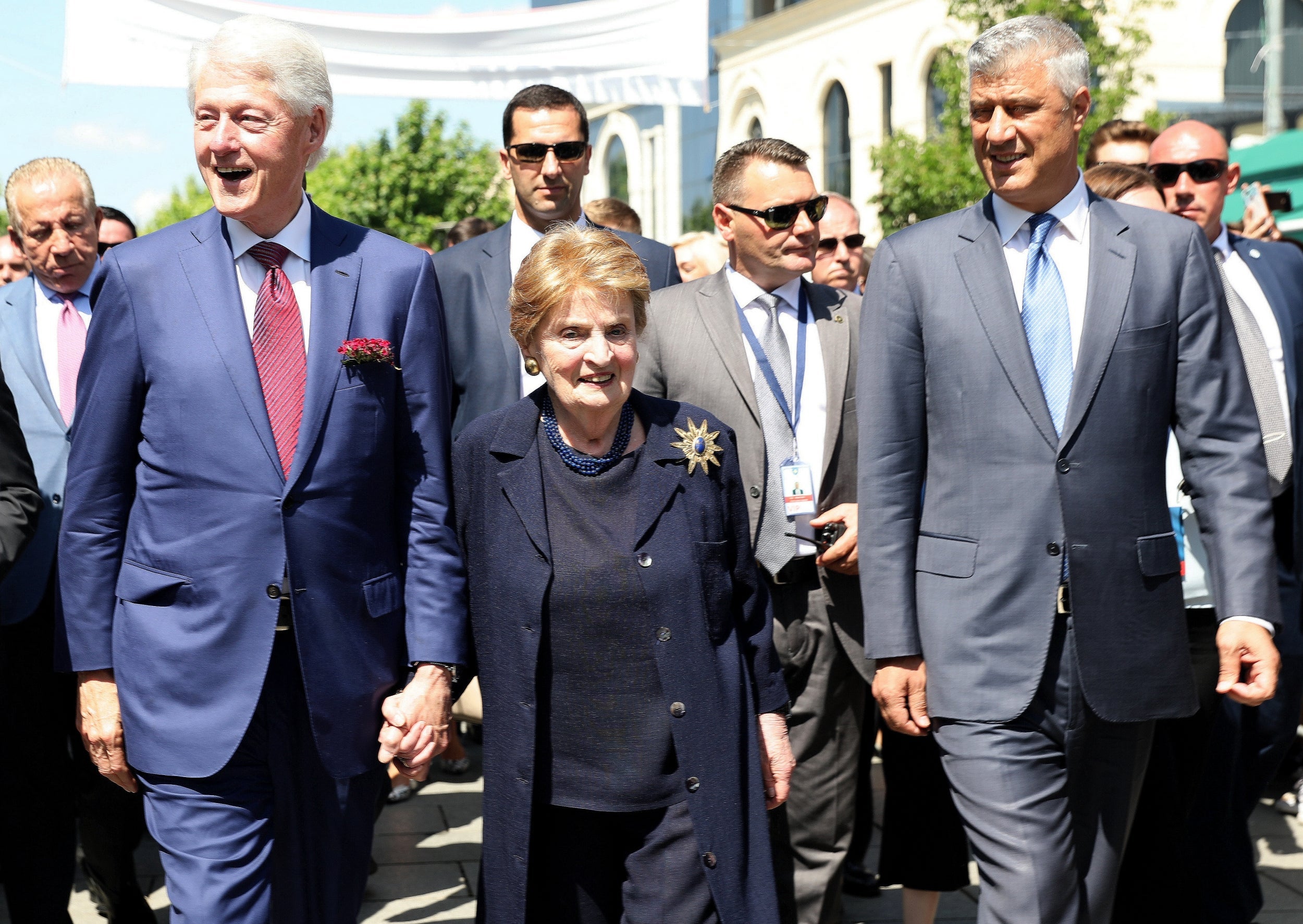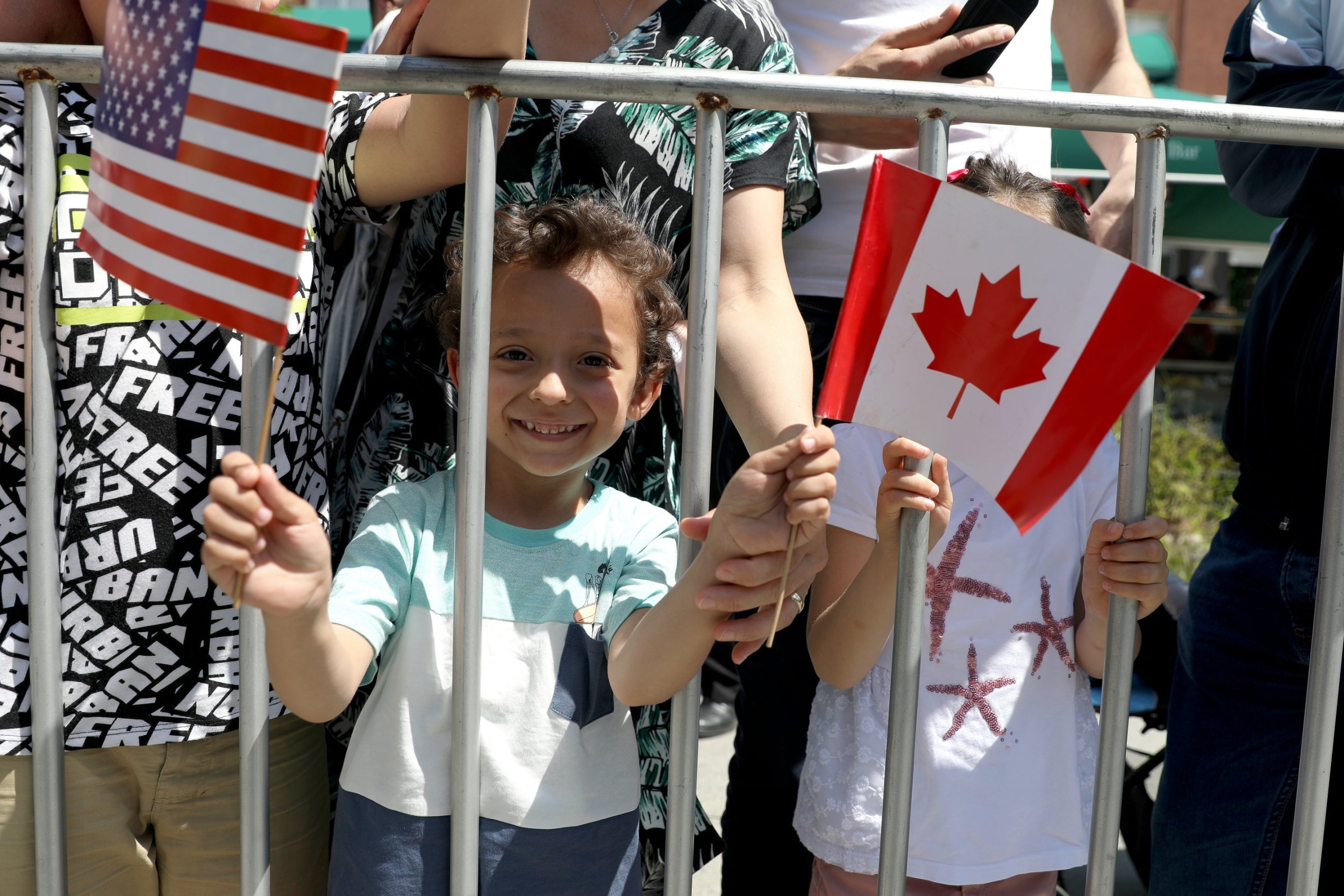Kosovo celebrates Clinton in pomp and ceremony 20 years after Nato’s intervention
The glaring absence from the proceedings was Tony Blair, widely viewed as a key architect of western action against Serbia

Your support helps us to tell the story
From reproductive rights to climate change to Big Tech, The Independent is on the ground when the story is developing. Whether it's investigating the financials of Elon Musk's pro-Trump PAC or producing our latest documentary, 'The A Word', which shines a light on the American women fighting for reproductive rights, we know how important it is to parse out the facts from the messaging.
At such a critical moment in US history, we need reporters on the ground. Your donation allows us to keep sending journalists to speak to both sides of the story.
The Independent is trusted by Americans across the entire political spectrum. And unlike many other quality news outlets, we choose not to lock Americans out of our reporting and analysis with paywalls. We believe quality journalism should be available to everyone, paid for by those who can afford it.
Your support makes all the difference.Kosovo marked the 20th anniversary of the end of a brutal war, and the birth of Europe’s newest nation, with pomp and pageantry – but also with reminders of the dangers that lie ahead with a peace agreement yet to be achieved with Serbia.
The celebrations in the capital, Pristina, were focused on thanking the international community and the US for the country’s independence. Bill Clinton, the president at the time of the conflict, was very much the star of the show with his then secretary of state, Madeleine Albright, leading the supporting cast.
Mr Clinton, who had been called “the founding father of Kosovo”, was presented with the country’s highest honour, the Order of Freedom, after he arrived in Pristina, with huge posters of his image welcoming him at roadsides.
There is already a gold-painted 11ft statue of the US president in the capital, and another one was unveiled on the day to Ms Albright.
In front of a crowd of several thousand in Skenderbeu Square, Mr Clinton and Ms Albright recalled the hard decisions made over spiralling strife that cost 15,000 lives and left 2.7 million people displaced, and insisted that ordering the western military mission against the Serbian regime of Slobodan Milosevic was a moral imperative.
The one glaring absence from the proceedings was Tony Blair, who is widely viewed as one of the key architects, along with Mr Clinton, of western action against Serbia.
Then British prime minister, he had visited post-war Kosovo to a rapturous reception even before the American president, arriving soon after a British-led Nato force moved into the former Yugoslav province. Such was his popularity that there was a vogue of naming baby boys “Tonybler”.
Kosovar officials said Mr Blair had been invited but was unable to attend. Yet his only namecheck in the numerous speeches at the international gathering came in the 43rd minute of the ceremony, when Mr Clinton mentioned that he had a photograph of Mr Blair, with others, at his office in New York.
No senior ministers from London were present for the anniversary of what is regarded as one of the UK’s few successful wars of liberal intervention, but that may have been to do with most of them being busy campaigning to get Theresa May’s job.
General Sir Mike Jackson, who had led Nato’s Kosovo Force, was not present. However, the American General Wesley Clark was in the large US party.
The two commanders had clashed during the war, in one of the most well-known examples of close allies falling out. Gen Jackson had refused the order of Gen Clark, his superior as the Supreme Allied Commander Europe, to force Russian troops to withdraw from Pristina airport and block the runway to stop reinforcements arriving.
“Sir”, said the British general, “I am not going to start World War Three for you.” Sir Mike had his way; neither Mr Blair or President Clinton wanted a confrontation with Moscow which may have spiralled out of control.
A Nato force of 3,500 remains in the country and a settlement with Belgrade is still elusive. Kosovo’s independence is recognised by 115 countries including the US, UK and most western European states, but not by Serbia, its allies Russia and China, nor by Spain, Romania, Cyprus and Slovenia.
Kosovar flags, stars and stripes, and a few Nato flags festooned the streets for the celebrations. There were repeated chants of “USA, USA” from the crowd throughout the speeches.
The Kosovar president, Hashim Thaci, spoke of his country’s aspirations to become members of the European Union and Nato. He said: “We are the most pro-American and pro-European nation on this side of the region, we deserve to be there.”

Ms Albright, in her speech, described how President Clinton woke her up late at night when the Nato’s bombing mission had started, to stress, “We are doing the right thing.” She continued: “We did it because our cause was fair. We will never forget about you, the future belongs to you.”
Mr Clinton, repeatedly cheered by the crowd, said: “I have always been proud that I was president of the United States when you needed someone to stand up and say, ‘No more ethnic cleansing, no more running people out of their homes, no more killing innocent civilians’.” The former president said Kosovans should “never forget the challenges” and “a new form of courage and patience is needed to build the future”.
Kosovar politicians, civic society leaders and activists have stressed that Britain remains a highly important partner with involvement in a number of key institutions and projects.
British ambassador Ruairi O’Connell has been at his post for four years having served four previous years in the country. He is held in high esteem by fellow international diplomats for his knowledge of Kosovo.
The ambassador said: “It has been 20 years since the war ended and there is obviously a need to find a settlement. But there has also been a definite sense of hope, of optimism in the last six months.

“But the only people who can really make it work are the people here. This is so important for a young generation who are ambitious, outward-looking and want to be part of the wider European family.
“The UK has a deep interest in seeing that Kosovo is stable and progressing in a just society based on the rule of law. This is not just imperative for the people of Kosovo but for us as well because of issues of great concern to the UK, such as international organised crime, money laundering and the trade in illicit goods including drugs. It is in our interest to help Kosovo fight these problems at source.”
US deputy assistant secretary of state Matthew Palmer said that Washington would continue to support Kosovo, but there was a need to ensure that the rule of law was applied. Furthermore, it was essential, he said, that a settlement was reached with Serbia.
Watching the celebrations, Amar Rexhapi, a 38-year-old businessman, said: “Yes, there should be much more done to make sure that the law is properly used. There is too much corruption and this is something the US, UK and Europe should force our politicians to face.”
His friend, 42-year-old Fatmir Gashi, added: “Of course it’s great that we got our freedom. But we cannot live on what happened 20 years ago, we need to start taking responsibility, creating jobs, making sure our young people stay in our country and not have to go away to find work. We need to look forward.”
Join our commenting forum
Join thought-provoking conversations, follow other Independent readers and see their replies
Comments